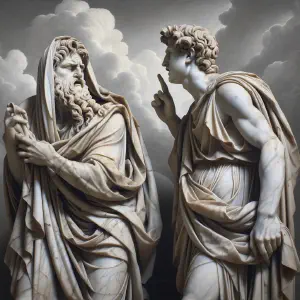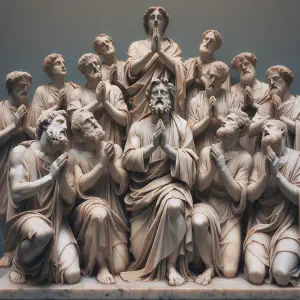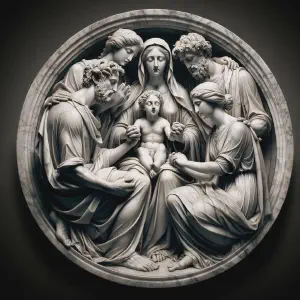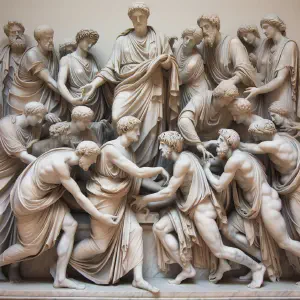The Promise of Emmanuel



Gabriel assured Mary of the Holy Spirit’s role in the birth of this holy child, citing Elizabeth’s miraculous pregnancy as a testament to God’s power. In a profound act of faith and obedience, Mary accepted her divine calling, declaring herself the handmaid of the Lord, ready to fulfill His will. With her faithful ‘yes’, the angel departed, leaving behind a promise that would change the course of history, a beacon of light in a world awaiting its Savior.
Five Questions
What does Isaiah’s prophecy about a virgin bearing a son signify in the context of Ahaz’s reign?
The prophecy delivered by Isaiah during King Ahaz’s reign is a pivotal moment in Biblical history. It signifies God’s intervention in human affairs, offering a sign of hope and divine presence. This prophecy about a virgin bearing a son, Emmanuel, underscores the coming of a Messiah, a savior, who will be God with us. In the context of Ahaz’s reign, it’s a reassurance of God’s unwavering commitment to His people, despite the challenges and fears they faced.
How does the Psalmist’s message in Psalm 24 relate to the themes of the story?
Psalm 24 complements the themes of the story by emphasizing God’s sovereignty and the importance of personal purity and righteousness. The Psalmist speaks about who may stand in God’s holy place, highlighting qualities such as sinless hands and a pure heart. This resonates with the story’s emphasis on faith and obedience to God, as seen in Mary’s acceptance of her divine role. It’s about seeking and preparing for the Lord’s presence, just as the world was being prepared for the arrival of Jesus.
In Luke’s Gospel, how does Mary’s reaction to the angel Gabriel’s message reflect her character?
Mary’s reaction to the angel Gabriel is a profound reflection of her character. Initially, she is troubled and questions what sort of greeting this might be, indicating her humility and contemplative nature. When told about her role in bearing the Son of God, her question, “How can this be?” reveals not skepticism but a natural curiosity and a desire to understand God’s plan. Her ultimate acceptance, “Behold, I am the handmaid of the Lord,” shows her extraordinary faith and obedience, embodying the virtues that define her character.
What is the significance of the angel Gabriel naming the child Jesus and declaring His future greatness and kingdom?
Gabriel’s announcement to Mary about naming her child Jesus is significant for several reasons. The name Jesus means “Yahweh saves,” directly pointing to His role as a savior. The angel’s declaration about Jesus’ future greatness and eternal kingdom emphasizes His divine nature and the fulfillment of Old Testament prophecies. It establishes Jesus as the heir to David’s throne and His kingdom as everlasting, transcending earthly limitations. This revelation underscores the pivotal role Jesus will play in salvation history.
How do the themes of faith, hope, and obedience in these scriptures apply to contemporary Christian life?
The themes of faith, hope, and obedience in these scriptures are timeless and highly relevant to contemporary Christian life. Faith is exemplified in Mary’s trust in God’s plan, hope in the anticipation of the Messiah as foretold by Isaiah, and obedience in Mary’s acceptance of her role. These virtues guide Christians today in facing life’s challenges, reminding them to trust in God’s plan, remain hopeful in His promises, and be obedient to His will. These scriptures encourage believers to embrace these virtues in their daily lives, fostering a deeper relationship with God.
Bible Study
Isaiah 7:10-14
The LORD spoke to Ahaz:
Ask for a sign from the LORD, your God;
let it be deep as the nether world, or high as the sky!
But Ahaz answered,
“I will not ask! I will not tempt the LORD!”
Then Isaiah said:
Listen, O house of David!
Is it not enough for you to weary men,
must you also weary my God?
Therefore the Lord himself will give you this sign:
the virgin shall conceive and bear a son,
and shall name him Emmanuel.
In Isaiah 7:10-14, the prophet Isaiah, a major figure in the Old Testament known for his prophecies of the coming of the Messiah, addresses King Ahaz of Judah. Ahaz, facing political and military crises, is offered a sign by God, which he refuses, perhaps out of fear or lack of faith. Isaiah, frustrated, prophesies that a virgin will bear a son named Emmanuel (‘God with us’). This prophecy is pivotal in Catholic theology as it foreshadows the virgin birth of Jesus Christ, aligning with the Catholic value of God’s providence and the anticipation of the Messiah as the fulfillment of Old Testament prophecies.
Psalm 24:1-2, 3-4ab, 5-6
R. (see 7c and 10b) Let the Lord enter; he is the king of glory.
The LORD’s are the earth and its fullness;
the world and those who dwell in it.
For he founded it upon the seas
and established it upon the rivers.
R. Let the Lord enter; he is the king of glory.
Who can ascend the mountain of the LORD?
or who may stand in his holy place?
He whose hands are sinless, whose heart is clean,
who desires not what is vain.
R. Let the Lord enter; he is the king of glory.
He shall receive a blessing from the LORD,
a reward from God his savior.
Such is the race that seeks for him,
that seeks the face of the God of Jacob.
R. Let the Lord enter; he is the king of glory.
Psalm 24, attributed to King David, reflects on the sovereignty of God over all creation and the moral qualities required to be in His presence. It emphasizes purity of heart and hands, and a rejection of vanity. This Psalm aligns with Catholic teachings on the necessity of personal holiness and integrity, as reflected in the Beatitudes and the Ten Commandments. It underscores the Catholic values of humility and reverence towards God, as well as the importance of seeking spiritual purity to receive God’s blessing.
Luke 1:26-38
In the sixth month,
the angel Gabriel was sent from God
to a town of Galilee called Nazareth,
to a virgin betrothed to a man named Joseph,
of the house of David,
and the virgin’s name was Mary.
And coming to her, he said,
“Hail, full of grace! The Lord is with you.”
But she was greatly troubled at what was said
and pondered what sort of greeting this might be.
Then the angel said to her,
“Do not be afraid, Mary,
for you have found favor with God.
Behold, you will conceive in your womb and bear a son,
and you shall name him Jesus.
He will be great and will be called Son of the Most High,
and the Lord God will give him the throne of David his father,
and he will rule over the house of Jacob forever,
and of his Kingdom there will be no end.”
But Mary said to the angel,
“How can this be,
since I have no relations with a man?”
And the angel said to her in reply,
“The Holy Spirit will come upon you,
and the power of the Most High will overshadow you.
Therefore the child to be born
will be called holy, the Son of God.
And behold, Elizabeth, your relative,
has also conceived a son in her old age,
and this is the sixth month for her who was called barren;
for nothing will be impossible for God.”
Mary said, “Behold, I am the handmaid of the Lord.
May it be done to me according to your word.”
Then the angel departed from her.
Luke 1:26-38 narrates the Annunciation, where the angel Gabriel visits the Virgin Mary, a young woman known for her profound humility and faith. Gabriel’s greeting ‘Hail, full of grace’ acknowledges Mary’s unique role in salvation history, chosen to bear the Son of God. Mary’s response, ‘Behold, I am the handmaid of the Lord,’ exemplifies perfect obedience and submission to God’s will. This passage aligns with Catholic doctrines on the divine motherhood of Mary, the Incarnation, and the concept of grace. It reflects the virtues of faith, hope, and charity, and underscores the belief in the power of God to accomplish the impossible, in line with Catholic teachings on faith and divine grace.
Lessons
These sacred passages teach us the profound virtues of faith and obedience to God’s will. Isaiah’s prophecy and Mary’s acceptance of her role in God’s plan exemplify unwavering trust in the Lord. The Psalmist’s words remind us of the purity and humility required to seek God’s presence. The angel Gabriel’s message to Mary about the miraculous birth of Jesus, the Son of the Most High, underscores the belief in God’s omnipotence and the fulfillment of His promises. These scriptures collectively inspire us to embrace faith, hope, and obedience in our daily walk with God, trusting in His eternal plan for salvation.
Meditation Prayer


We pray, O Lord, that these readings stir within us a call to action. May we, like Mary, respond to Your call with a willing heart, ready to serve according to Your plan. Help us to embody the virtues of faith, hope, and obedience in our daily lives, and to be beacons of Your love and grace in the world. Encourage us to ascend the mountain of the LORD, striving for purity of heart and hands, that we may be worthy to stand in Your holy place. We ask this in the name of Jesus Christ, our Lord and Savior. Amen.